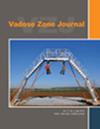Soil water content estimation by using ground penetrating radar data full waveform inversion with grey wolf optimizer algorithm
IF 2.8
3区 地球科学
Q3 ENVIRONMENTAL SCIENCES
引用次数: 0
Abstract
Soil water content (SWC) estimation is important for many areas including hydrology, agriculture, soil science, and environmental science. Ground penetrating radar (GPR) is a promising geophysical method for SWC estimation. However, at present, most of the studies are based on partial information of GPR, like travel time or amplitude information, to invert the SWC. Full waveform inversion (FWI) can use the information of the entire waveform, which can improve the accuracy of parameter estimation. This study proposes a novel SWC estimation scheme by using the FWI of GPR, optimized by the grey wolf optimizer (GWO) algorithm. The proposed scheme includes a petrophysical relationship to link the SWC with the relative dielectric permittivity, 1D GPR forward modeling, and a GWO optimization algorithm. First, numerical modeling was carried out, and the proposed scheme was applied to both noise‐free and noisy data to verify its applicability. Then, the proposed method was applied to data collected from a field experimental site. These results, derived from both synthetic and real datasets, show that the proposed inversion scheme resulted in a good match between the observed and calculated GPR data. In the numerical modeling, it was observed that the SWC could be inverted accurately, even when noise was present in the data. These demonstrate that the GWO method can be applied for the quantitative interpretation of GPR data. The proposed scheme shows potential for SWC estimation by using GPR full waveform data.利用灰狼优化算法,利用地面穿透雷达数据全波形反演估算土壤含水量
土壤含水量(SWC)估算对水文学、农业、土壤科学和环境科学等许多领域都很重要。地面穿透雷达(GPR)是一种用于估算土壤含水量的前景广阔的地球物理方法。然而,目前大多数研究都是基于 GPR 的部分信息(如行进时间或振幅信息)来反演 SWC。全波形反演(FWI)可以利用整个波形的信息,从而提高参数估计的准确性。本研究利用 GPR 的全波形反演提出了一种新的 SWC 估计方案,并通过灰狼优化器(GWO)算法进行了优化。提出的方案包括将 SWC 与相对介电常数联系起来的岩石物理关系、一维 GPR 正演建模和 GWO 优化算法。首先,进行了数值建模,并将提出的方案应用于无噪声和噪声数据,以验证其适用性。然后,将提出的方法应用于从现场实验地点收集的数据。从合成数据集和真实数据集得出的这些结果表明,所提出的反演方案使观测到的 GPR 数据与计算出的数据之间达到了良好的匹配。在数值建模中,观察到即使数据中存在噪声,也能准确反演出 SWC。这表明 GWO 方法可用于 GPR 数据的定量解释。建议的方案显示了利用 GPR 全波形数据估算 SWC 的潜力。
本文章由计算机程序翻译,如有差异,请以英文原文为准。
求助全文
约1分钟内获得全文
求助全文
来源期刊

Vadose Zone Journal
环境科学-环境科学
CiteScore
5.60
自引率
7.10%
发文量
61
审稿时长
3.8 months
期刊介绍:
Vadose Zone Journal is a unique publication outlet for interdisciplinary research and assessment of the vadose zone, the portion of the Critical Zone that comprises the Earth’s critical living surface down to groundwater. It is a peer-reviewed, international journal publishing reviews, original research, and special sections across a wide range of disciplines. Vadose Zone Journal reports fundamental and applied research from disciplinary and multidisciplinary investigations, including assessment and policy analyses, of the mostly unsaturated zone between the soil surface and the groundwater table. The goal is to disseminate information to facilitate science-based decision-making and sustainable management of the vadose zone. Examples of topic areas suitable for VZJ are variably saturated fluid flow, heat and solute transport in granular and fractured media, flow processes in the capillary fringe at or near the water table, water table management, regional and global climate change impacts on the vadose zone, carbon sequestration, design and performance of waste disposal facilities, long-term stewardship of contaminated sites in the vadose zone, biogeochemical transformation processes, microbial processes in shallow and deep formations, bioremediation, and the fate and transport of radionuclides, inorganic and organic chemicals, colloids, viruses, and microorganisms. Articles in VZJ also address yet-to-be-resolved issues, such as how to quantify heterogeneity of subsurface processes and properties, and how to couple physical, chemical, and biological processes across a range of spatial scales from the molecular to the global.
 求助内容:
求助内容: 应助结果提醒方式:
应助结果提醒方式:


